watch now!
A place where I discuss all things related to toddlers and motherhood!
Subscribe to my Youtube channel
As a clinical psychologist, published author, and mother to two cheeky young children, I get it. I’ve spent YEARS researching and filtering through the noise online, so you don’t have to.
PARENTING TIPS
POTTY TRAINING
ANTIRACISM
PLAY
Blog Topics
SIBLING RIVALRY
SCREEN TIME
TANTRUMS
DISCIPLINE
Hi I'm Dr. Jazmine
Raising Critical Thinkers
topics:
Rather listen? Here’s a link to the episode on my podcast.
“Most children are amazing critical thinkers before we silence them.” – bell hooks
Children naturally have a thirst for knowledge – they come into this world eager to study it – yet we as adults take this for granted.
They naturally question everything, tinker around, take risks, innovate new ways to play with random, everyday items. They never stop moving and fear doesn’t always register for them. They want to constantly run, jump, throw, push, pull, and pound…
But gradually over time, we silence them without often meaning to. Our fears, expectations, rules, agendas and love for control slowly starts to teach children to doubt their instincts and look to others on what to think of the environment.
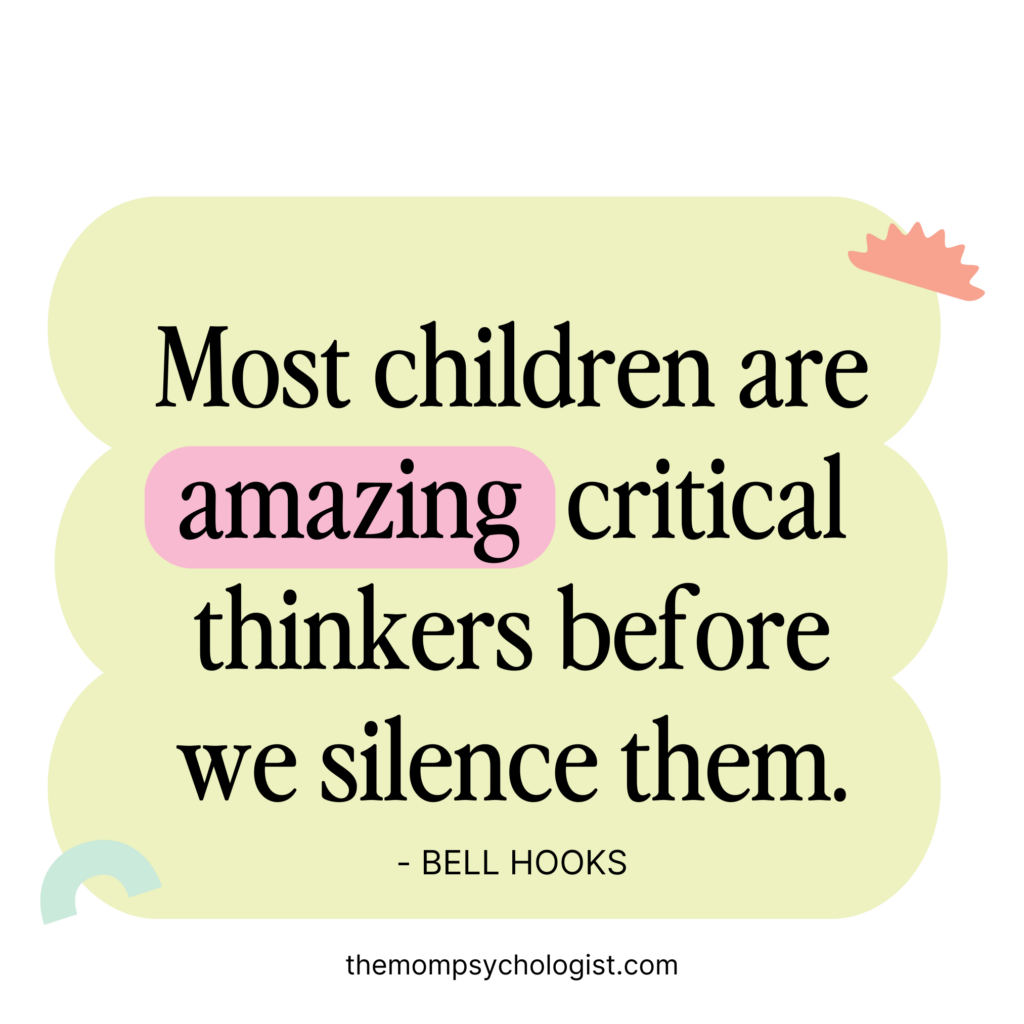
Here’s the thing – we must consciously raise our children or society will raise them.
We must teach them to think for themselves or they will be easily influenced and manipulated by their peers, social media and adults.
Children with strong critical thinking skills feel more confident in themselves and their ideas and they are the people who change the world with their innovative and creative ideas. Critical thinkers are the leaders, inventors, CEOs, scientists, writers – of our generation. They are the ones who change the world.
Not only does critical thinking translate into better careers, but this skill is critical for communication and building healthy relationships with self and others. They are the people who influence others for better and inspire their siblings and peers towards positive change.
In our fast paced society of AI, social media, endless information & marketing, our children can’t afford to not have this skill.
It’s not a “nice to have” – it’s a must. If we don’t teach our children how (and what) to think, the world will do this for us.
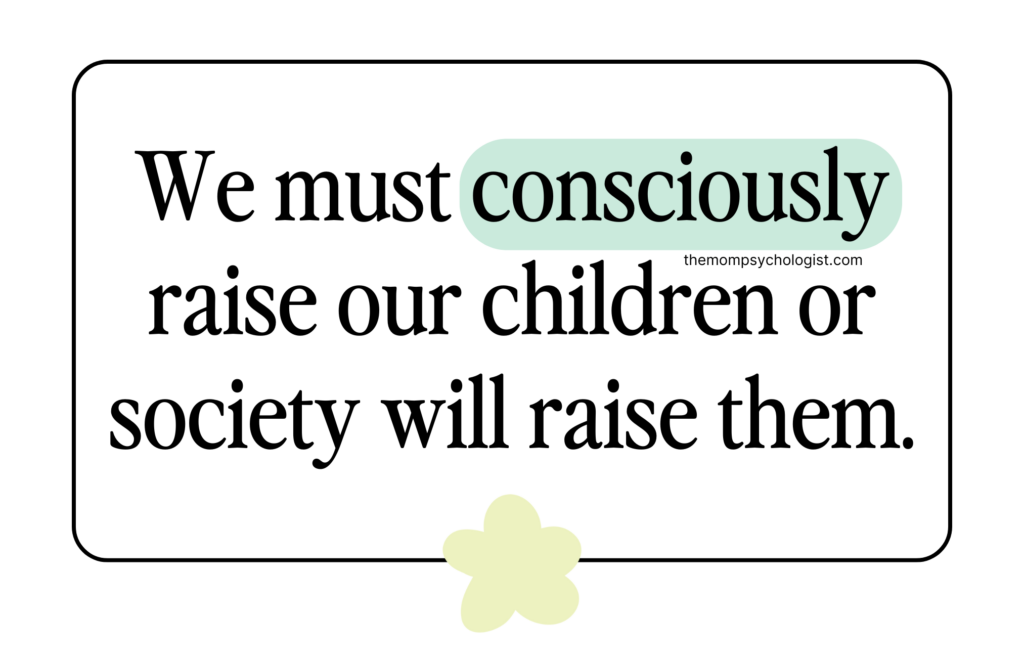
And when it comes to the relationship you build, children will come to trust us more when we trust in them to think for themselves. Trust is built when our children know we have their best interest in mind and blind obedience and control is not in the best interest of our child (and their future self).
Caution: This approach will require more thought, effort and intention. We will need to be more flexible, respectful, and patient as our children learn to question and form their own ideas. It will require us to learn and practice critical thinking ourselves and have less “control” as parents – but the pay off – raising a conscious human being – is worth it, if you ask me.
So how do we do this? What does this really look like in everyday life?
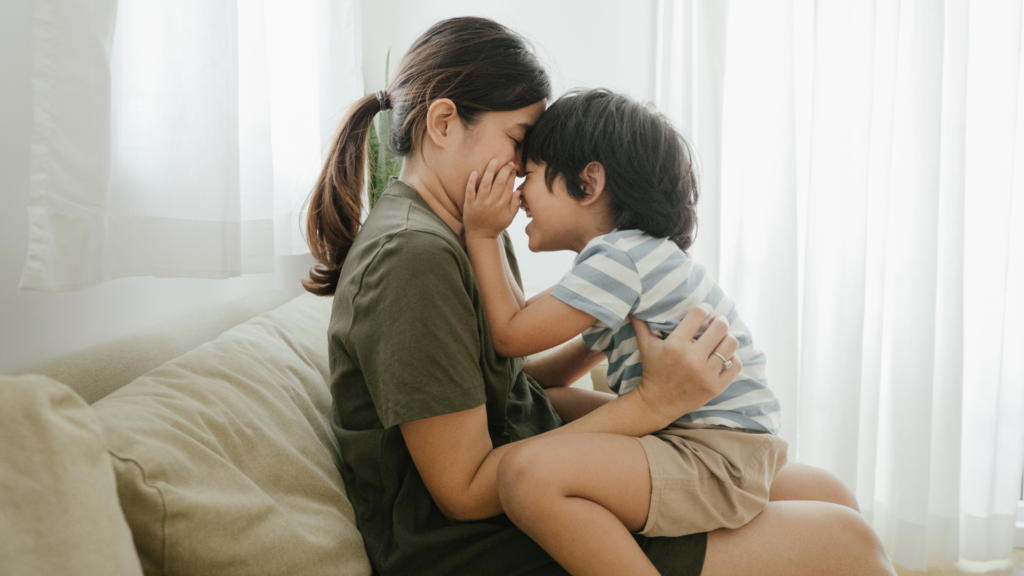
The DCM Method
In order to raise critical thinkers, we are going to attack this issue from several different angles. We are going to be more conscious in the ways we discipline (teach and correct behavior), the types of conversations we spark, and the media we choose to expose them to.
D- Discipline
C- Conversations
M- Media
The spirit of this approach is consciousness – to do something in a deliberate and intentional way. In order to be a critical thinker, we must first be aware, intentional and deliberate about our actions.
1. Discipline Consciously
As parents, we are conditioned to desire control. The assumption is that if we don’t have control over our children, then we are failures. We are somehow flawed as parents.
The gold standard in parenting (whether we talk about it or not) is control.
This assumption is at the root of authoritarian parenting – do as I say and do not ask questions or challenge me. If you do, you will be punished.
Our society reinforces this model through punishment and rewards. Do something “Good” (aka what I want you to do) and you will be rewarded in the form of stickers, prizes, trinkets, praise, special privileges, good grades, and approval.
On the other hand – if you are “bad” (aka don’t do what I say) you will be punished in the form of criticism, cold silence, spanking, time outs, isolation in your room, lectures and disapproval.
Who really benefits from this system? Who really wins here? Those who created it and those who enforce it.
As parents, we must question why we do what we do. Who is teaching us how to parent and is this really how we want to be?
Now I teach conscious discipline in more depth inside my online discipline course, Positive Discipline Academy, but to help get you started today, learn to question everything.
Consciousness is built on awareness and we can’t have awareness if we are not regularly reflecting on who we are as parents and why we do what we do.
- Start to question what you naturally take for granted
- Rules and limits
- Routines and schedules
- How you discipline
- Assumptions and expectations of yourself and child
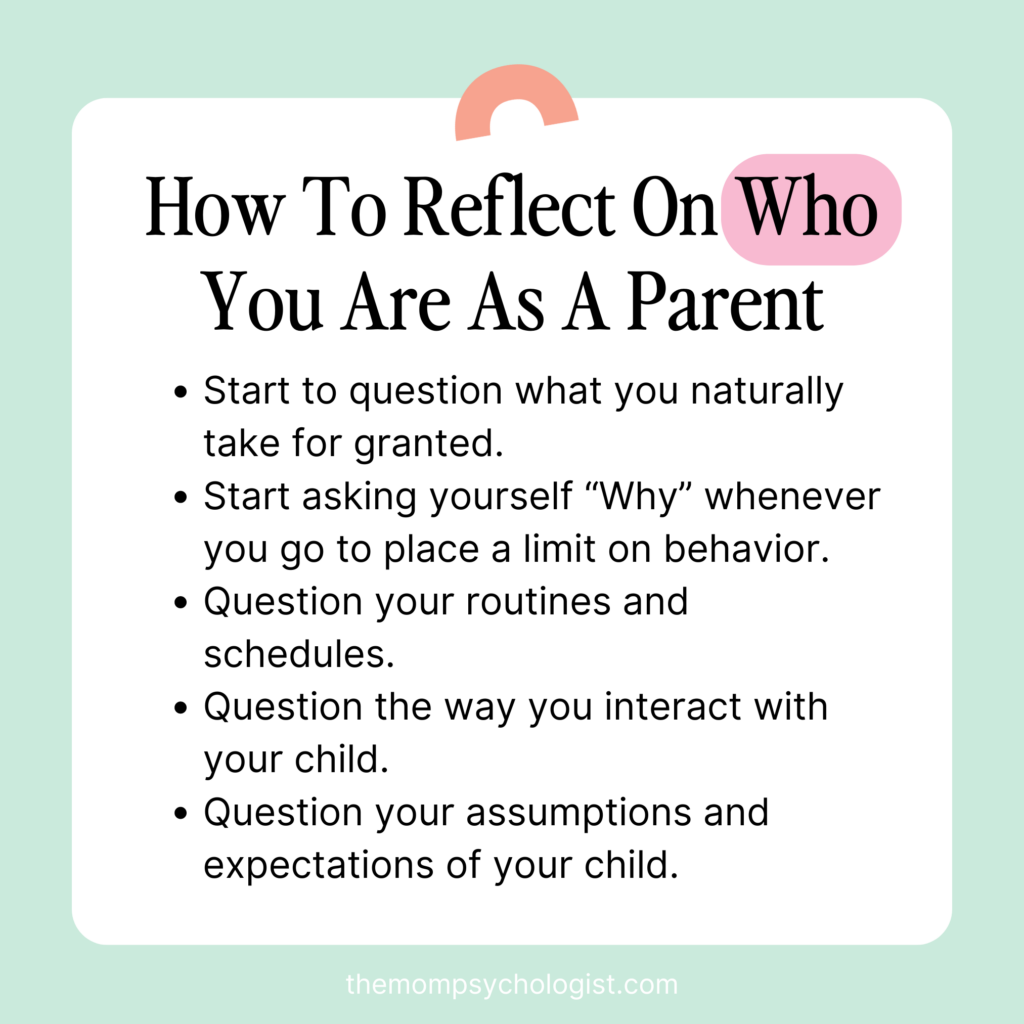
- Start asking yourself “Why?” whenever you go to place a limit on behavior:
- Why can’t they throw?
- Why can’t they have this for breakfast?
- Why can’t they be upset?
- Why can’t they be in conflict with their siblings? Why is conflict “bad?” Who taught me to think this way?
- Instead of shutting down the behavior, how can I teach or guide them towards a “better” behavior?
- Why is what I’m teaching considered “better”?
- How can I see this situation from my child’s perspective? What is their view?
- Reflect on a recent conflict you had with your child and question the limits and things you said to them.
- Question your routines and schedules:
- Why do we do the things we do?
- Is this the best sequence of events?
- Do we need to do X or is Y better?
- Bonus: Encourage your child’s input
- Question the way you interact with your child:
- Does my approach foster open dialogue or one-sided communication?
- Do I really take time to listen to my child or am I often distracted with multi-tasking, what I’m going to say next, my agenda or my own worries?
- Do I take time to teach or am I focused on changing behavior?
- Do I welcome my child’s perspectives, feelings, and concerns or do I see them largely as inconveniences?
- Question your assumptions and expectations of your child as much of this is based on society and what others’ think. For instance, if we feel pressure from family to raise an “independent child” we are more likely to get annoyed and force this skill onto our child.
A lot of my work with parents inside my private membership centers around this. Oftentimes, when we get to the bottom of it, parents feel pressured by family members to hold a certain limit on their child, for instance, getting dressed independently. So they keep fighting with their child on this and feel helpless about it.
Oftentimes, it is our own expectations on our child that lead to our problems in parenting, not our child and their behavior.
So ask yourself:- What assumptions do I have about my child and their behavior and personality?
- What expectations do I have of them? What are the things I think they should be doing?
- Where do my assumptions and expectations come from? Who taught me to think this way?
- Are my assumptions and expectations based in reality or some ideal version of what I think my child should be? Are they aligned with my unique child and where they’re at right now? Why or why not?
- Question how you see yourself as a parent:
- What is my main role/objective as a parent? Where does this way of thinking come from?
- In what ways did my parents teach me how to parent? How do I model their ways?
- How do I NOT want to parent?
- How DO I want to parent?
- What are my values and does my approach align with these values?

2. Conversate Consciously
Questions are the foundation of critical thinking. In order to think better, we have to learn to question better.
Questions help children become better thinkers because it directly asks them to think.
Thus, in order to raise critical thinkers, we the parents must get in the habit of asking better questions. Asking the right questions at the right time sparks reflection, thought, interesting dialogue, and builds trust and connection.
The funny thing is children are naturally great at asking questions. Our problem is we are not great at answering them. In our busy lives (often balancing multiple children, jobs, marriage, etc), it is tempting to ignore, shut down or put off their questions.
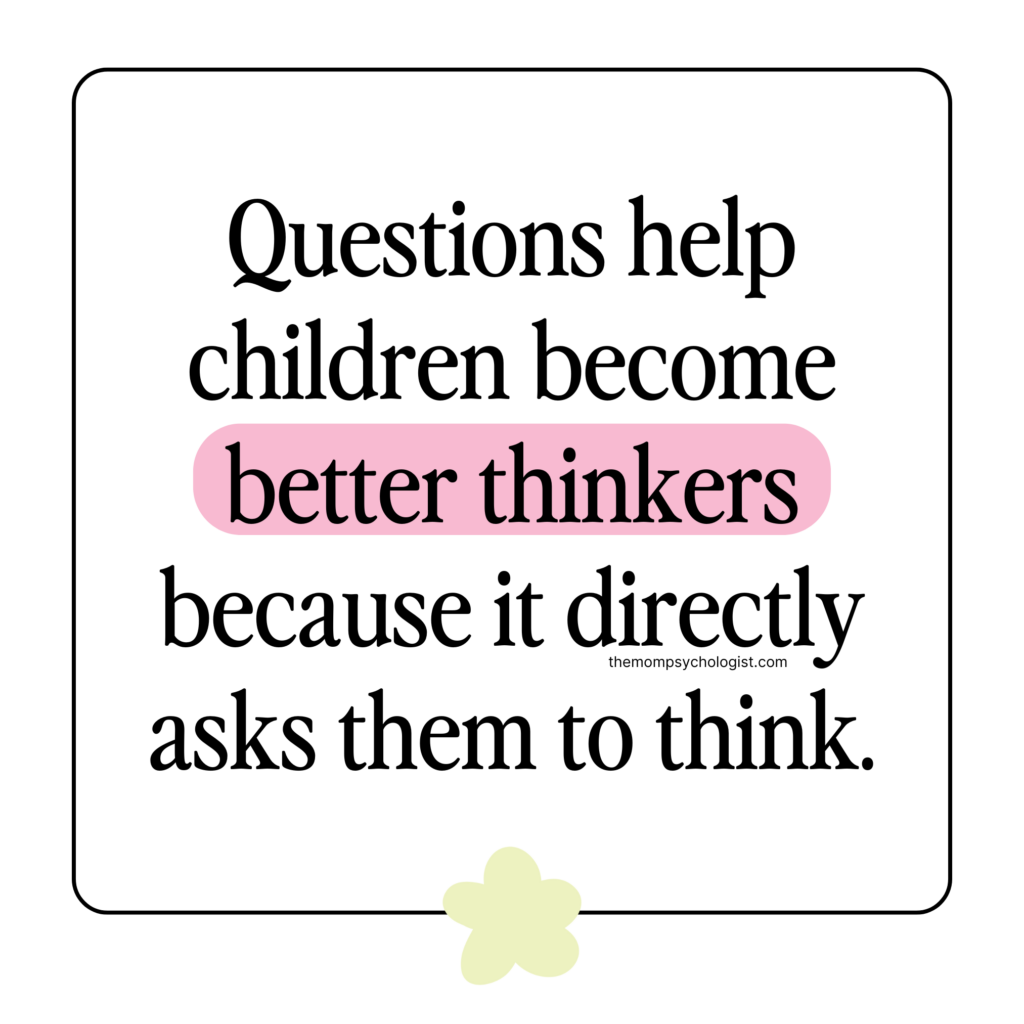
“Not right now.” we think (or say). But then “now” never comes and slowly we teach our child to stop asking questions. Questions are seen as an inconvenience and a weakness. And slowly, children learn to shut up and stop asking questions at home or in the classroom.
If we want to turn this cycle around, we must:
- Stop and ponder their questions.
- Compliment them for asking questions (e.g., “Ooh, I’ve never thought of that.” or “What a great question.” or “Thanks for asking.”).
- Flat out tell them: “Never stop asking questions. Questions are how we learn. I might not know all the answers to your questions but we can learn together.”
- Learn to put their question back on them (and listen intently to their reply) – “Hmmm, that’s an interesting question. What do you think?”
- Start asking better questions that inspire true thought.
Asking open-ended questions that spark reflection, curiosity, reasoning ability, and critical thinking is important now more than ever.
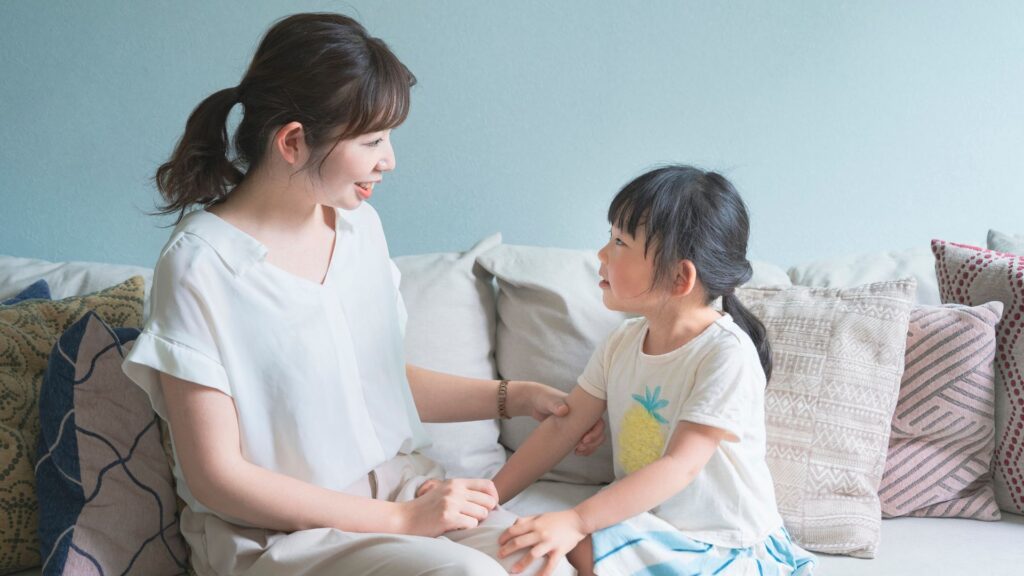
8 Questions to help children think:
- “Tell me about what you built/created.”
- “How did you feel as you created it? How does it feel now it’s done?”
- “Can you think of a new way to do this?”
- “What’s another possible reason this could be happening?”
- “What did you learn?”
- “How might you explain this to someone who doesn’t know this?”
- “How might you do it differently?”
- “Why did you choose X over Y?”
3. Consume Media Consciously
If we’re being honest, much screen time is really “babysitter time.” Screens allow us to “checkout” as parents and either take a break, work or get things done around the house.
The problem with this approach is that:
- Children are (literally) left to their own devices. They are forced to figure out the shows, movies, and apps on their own. We miss the opportunity to teach how to understand the information they consume (i.e., critical thought).
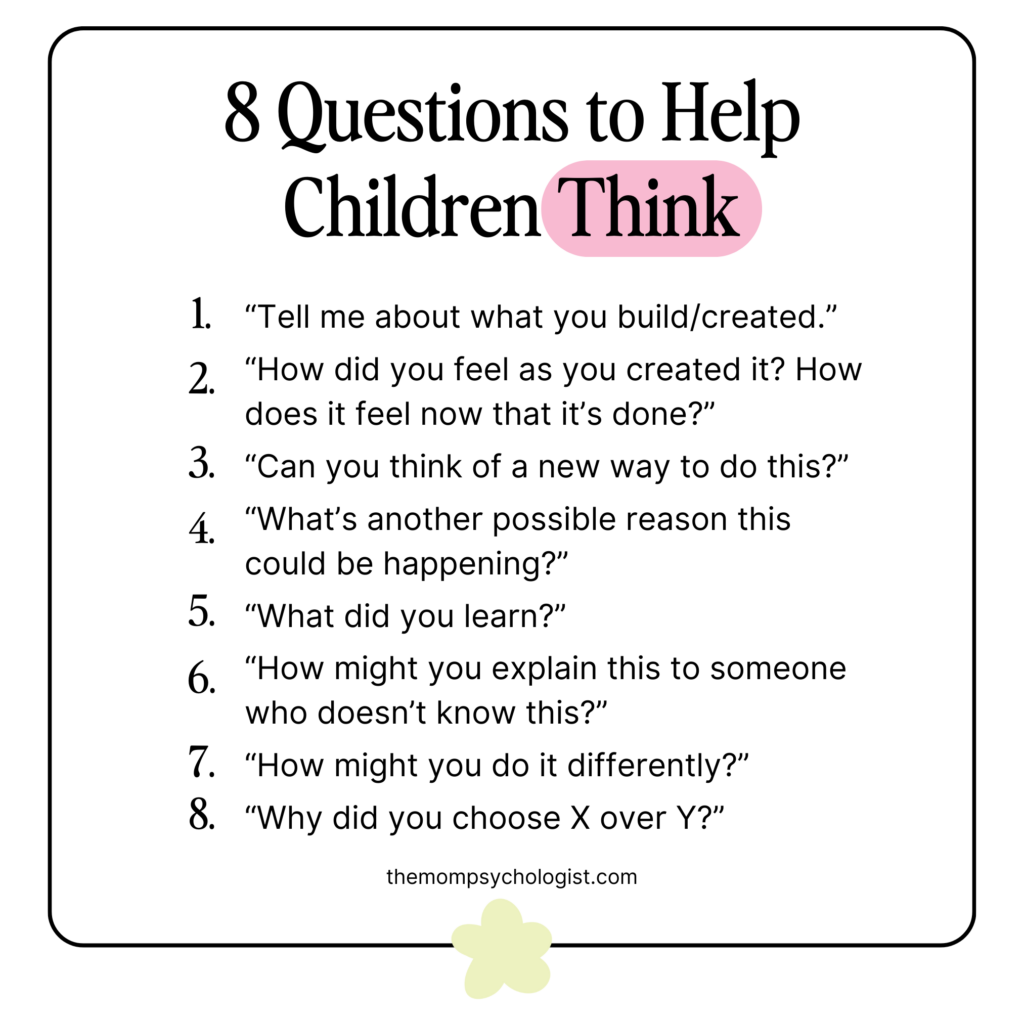
- Parents miss opportunities to critically examine the media they expose to their children.
The harsh reality is that most “children’s” media is not made for young children’s minds so children grow up exposed to information they are not developmentally ready to consume.
Much of children’s media includes:
- Stories of lies and deceit
- Adult innuendos and adult themes (e.g., marriage)
- Adult scenarios that children rarely face
- Fantasy and magical thinking that young children can’t quite grasp (i.e., the line between fantasy vs. reality is often blurred for young children so they often think what they are seeing is real when it is not)
Children’s media is made by adults and so they often use their adult way of thinking to craft the stories, plots, and characters. They also want to appeal to the parents (because we are the ones who buy the product) – so they infuse ways to entertain and please us.

Adding insult to injury, children rarely receive guidance on how to understand this media so they end up blindly watching things they can’t yet understand (which conditions them to be mindless consumers). And then, in an effort to try to understand it, they emulate the words and behaviors they see characters do and then get in trouble for it without ever understanding why.
“Why can’t I do the things characters I admire do? Why is this ‘bad’ when it’s all I know? Does that mean I’m bad too?”
Now I’m not saying you must be present for every show, movie or game your child places. But what I am advising you to do is:
- Carefully research the media you expose your child to and/or
- If the media is new, consume it WITH your child so that you have a sense of what they’re being exposed to and can either shut it off (if you deem it inappropriate) or use these moments to teach and encourage critical thought.
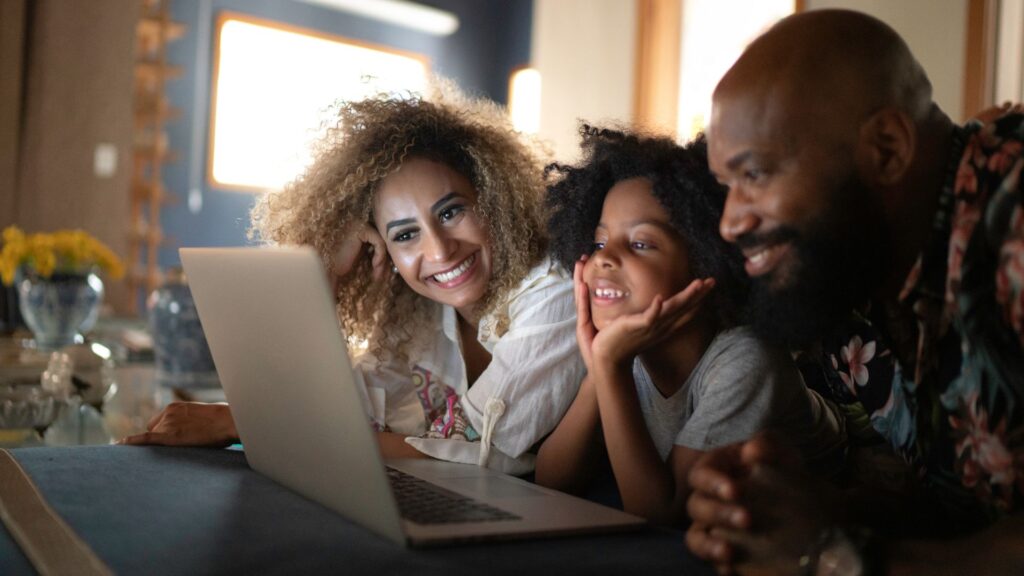
Tips while consuming media:
- Notice moments when the characters make “poor” choices (e.g., lying to avoid getting in trouble, sneaking around their parents, not saying their true feelings). Use these moments to spark conversation with your child:
- “Was that a lie or the truth?”
- “I wonder what made him decide to say that? What was he afraid of?”
- “I wonder how this will impact his relationship with them? Hmm…”
- Notice characters’ feelings and point them out.
- “She’s sad her dad won’t let her go outside.”
- “He’s angry! Very angry at his friend for playing a prank on him. I’d probably feel the same way, too. Would you?”
- Help your child digest the overall message or lesson. At the end, summarize the story and say, “Stories tend to have a lesson they want us to learn. What do you think this story’s message was?” If they struggle with this, share your ideas and ask, “What do you think?”
While reading with my daughter the other night, we had a great conversation about how two people can have the same experience but tell a completely different story based on their own perception, feelings, history, agenda, etc. Find opportunities to teach this concept in everyday stories.
When it comes to critical thinking, being aware of this basic truth is essential so look for opportunities to teach this theme using the media (or everyday experiences) they are exposed to.
Questions to ask as you consume media with your child:
- “Whose perspective is being told in this story? How might the other characters/people tell the story?”
A crucial part of dissecting information is always understanding who is telling you this information & how others’ perspectives may differ.
Help them understand there are often many sides to a story especially when learning about history and current events.
- “How might we look at this from a different perspective?”
Along those same lines, help them understand that there are multiple ways to look at one thing.
The foundation of problem solving is being able to approach a problem from many different angles and perspectives so that you can come up with the “best” option to test.
- “What questions do you still have about this?”
And then help them learn how to do their own research to find the answers to their questions.
The way our children learn to consume and process information is heavily impacted by the types of questions we ask them about what they are building, creating and learning.
Whether it’s through reading, YouTube/Google search, asking someone with experience, etc., encourage them to find the answers to their questions.
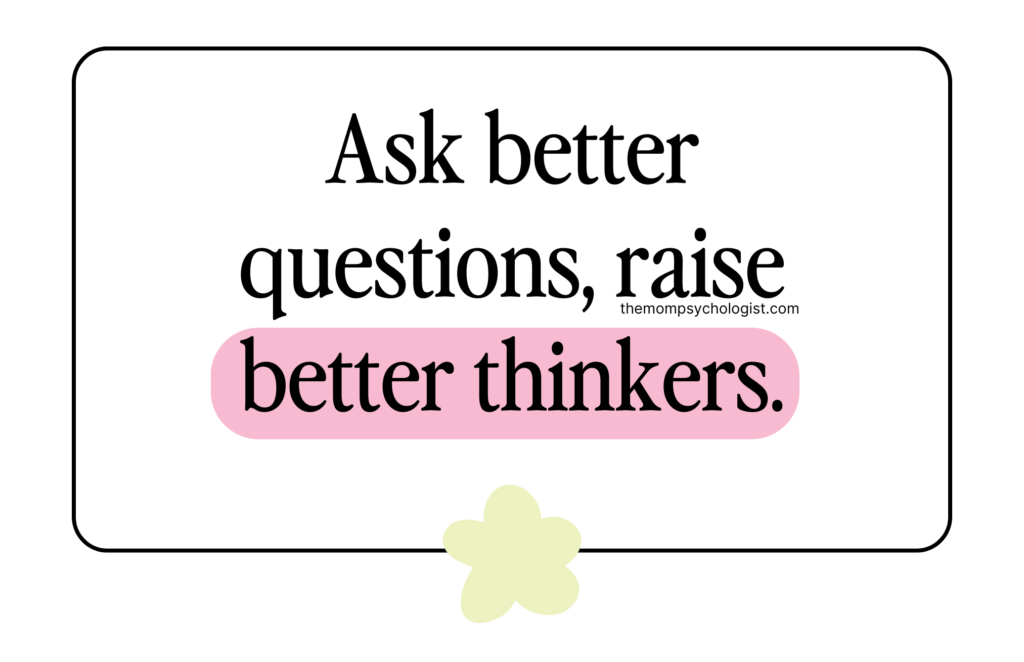
Ask better questions, raise better thinkers.
In the coming weeks, I’ll share some of my recommendations in terms of children’s media (e.g., movies, books, shows, apps) but in theme with this article, I urge you to critically examine others’ recommendations (including mine) by researching and checking it out for yourself before making conclusions.
Are you still reading this? If so, in true critical thinking fashion – let me know what YOU think! Drop a comment down below! I’d love to hear from you!
That’s it for this letter.
Thanks for reading.
Until next week,
-Dr. Jazmine
For my courses, books, free tools and more – visit my website here.
Was this helpful? Save it for later!
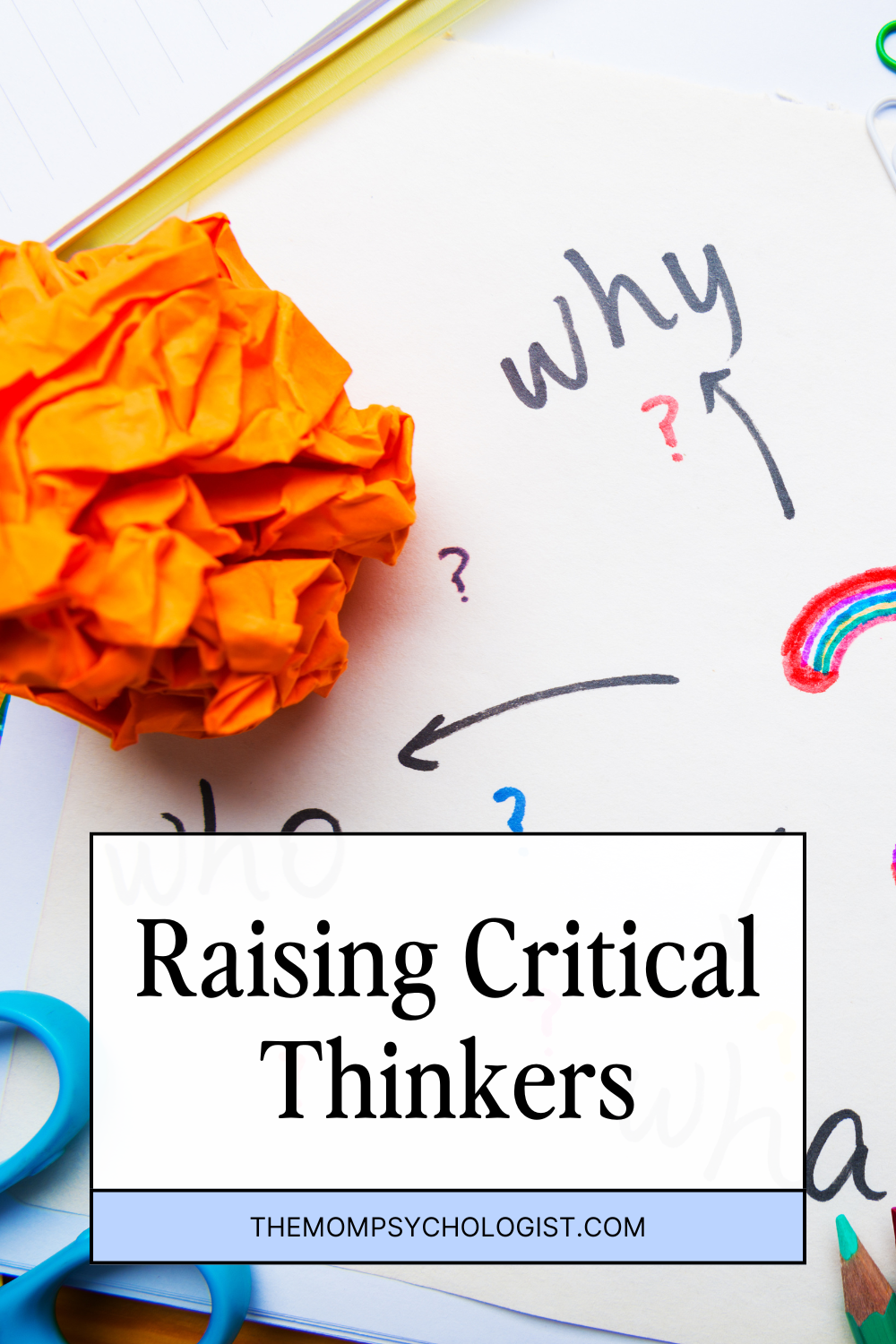
Leave a Reply Cancel reply
Copyright The Mom Psychologist® 2025
grab my free script pack!
explore
work with me
information
About
Blog
YouTube
Podcast
Privacy Policy
Terms of Use
Product Disclaimer
Contact
TMP Times (Newsletter)
This is one of the most vital traits we can nurture in kids. Thank you for sharing such clear, salient thoughts about critical thinking, and examples of questions for exploring it. “It” being life on one’s own terms, in reality, with the ability to engage in “it.”